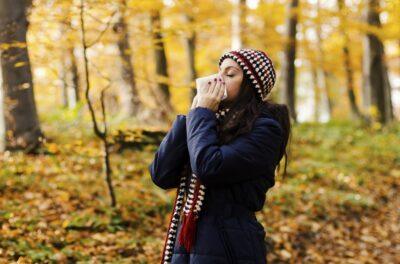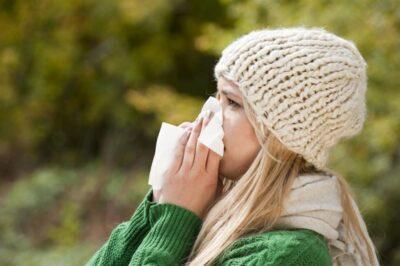|
Listen To The Article
|
Autumn is a lovely time of the year — unless you suffer from fall allergies.
Many allergies during this time of the year are due to an increase in molds inside and outdoors. Mold growth increases due to rain, decomposing plants, and reduced air flow within buildings as we close up for cooler weather. If you have a fireplace or woodstove, you may be exposed to allergens in smoke. Dust mites and animal dander are common offenders as well.
Could This All-Natural ‘Detox’ Capsule Have Extended John Wayne’s Life?
Fall also is the time of the year when the common cold becomes more prevalent. Sometimes it is difficult to differentiate between a cold and an allergy. It is important to know what is causing you to suffer so that you can obtain prompt relief and prevent future illnesses from arising.
Signs and Symptoms of Fall Allergies and Colds
Here are some characteristics of fall allergies and colds which will help you to determine what you are experiencing. If you have serious symptoms or are unable to determine which condition that you are suffering from, consult with your health care provider for expert diagnosis.
- Allergies are more likely than colds to occur in autumn and spring. Colds may arise at any time of the year, but they are most common during the winter months.
- If people close to you are healthy, yet you are suffering from respiratory symptoms, it is more likely that you are suffering from an allergy. Colds generally affect several individuals within the same home or workplace.
- You are more likely to be suffering from a fall allergy if you have previously experienced similar symptoms in past autumns.
- Nasal mucus from allergies is generally clear. Mucus due to colds may be clear or yellow. If you have green mucus, see your health care provider, as you may have an infection. Allergies and colds may produce stuffy or runny noses.
- Allergies are more likely than colds to cause red, itchy or runny eyes.
- Symptoms persist as long as the offending substance is present. Allergies may last for less than a day or hang on for months. Colds usually resolve within less than two weeks.
- While you may have a cough due to an allergy, you are more likely to suffer from one if you have a cold.
- Allergies do not cause fevers, but colds do.
- Both conditions may cause your throat to be sore. However, sore throats are more common and severe when colds are the culprit.
- You are unlikely to suffer from generalized aches and pains if your symptoms are due to allergies.
- Allergies do not usually cause fatigue, while colds may be exhausting.
- Symptoms of allergies often develop faster than those caused by colds.
Determining the Cause of Your Fall Allergy
If you believe that your symptoms are caused by an allergy, the next step is to identify the offending substance. Listen to news reports. They often provide information about molds, pollens and other toxins which are elevated locally. Notice what precipitates your symptoms. Are they worse outside or inside a specific building? Notice what has changed in your life. For example, are you now running a furnace that has not had an air filter changed in a while? Are you wearing wool clothing, while in summer you wore cotton?
Consulting with a natural or mainstream health care provider may be beneficial. There is a wide array of tools that help identify allergies. Keeping a journal, muscle testing, and advanced allergy testing may be useful. Once the offending substance is identified, you can take steps to avoid or eliminate it.
Get Rid of Molds and Mildew
Molds and mildew can precipitate fall allergies and even can cause serious, sometimes fatal, diseases. If you have an obvious mold problem in your home, seek temporary housing elsewhere. Have the mold professionally identified and treated. Here are some strategies for preventing and removing molds and mildew.
- Change air filters on heating systems regularly. Use the best quality filters that you can afford.
- Get your heating systems and chimneys professionally cleaned before using them in the autumn.
- Examine your home for signs of roof and plumbing leaks. If leaks are present, repair them immediately.
- Consider using a dehumidifier if your home is damp.
- Clean and change water trays under the refrigerator regularly.
- Circulate the air in your home by using fans.
Bleach and natural essential oils are excellent for removing mold and mildew.
Treating Fall Allergies
Eliminating exposure to offending allergens is the most effective way to prevent symptoms from arising. Since this is not always possible, the next step is to strengthen your entire body so that your respiratory and immune systems are working optimally. This step takes time. If means not smoking, taking preventative measures in the environment, eating well, and taking supplements which support your well-being.
If you are already suffering from symptoms of a fall allergy, try taking the homeopathic remedy Allium cepa. It is particularly helpful if you suffer from a runny nose or eyes.
New “Survival Herb Bank” Gives You Access to God’s Amazing Medicine Chest
Around 100,000 units of natural vitamin A may be taken for up to one month. It will boost the action of your immune system. Do not use synthetic vitamin A, as it may be harmful. This dose should not be used by pregnant women, children, individuals with liver or kidney disease, or people who have a history of alcohol or drug abuse.
Roughly 3,000 to 10,000 milligrams of vitamin C may be taken to reduce inflammation and stimulate the immune response. If loose stools arise, decrease the dose. Use natural, esterified or buffered form.
From 50 to 80 milligrams of zinc may be taken daily. The lozenge form is best. Multiple studies support its use as beneficial for the immune system.
Oregon grape root, barberry, elecampane, white oak bark and goldenrod are excellent herbs to relieve symptoms.
Consult with your health care provider for individualized guidance or if you have underlying health issues.
How do you fight fall allergies? Share your tips in the section below:
Harness The Power Of Nature’s Most Remarkable Healer: Vinegar
 Off The Grid News Better Ideas For Off The Grid Living
Off The Grid News Better Ideas For Off The Grid Living





